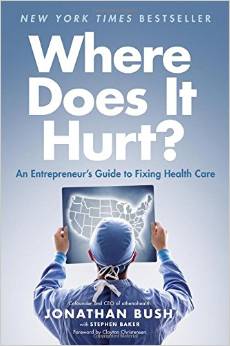Jonathan Bush on where it hurts most

Jonathan Bush, former ambulance driver, founder of birthing centers in San Diego, and co-founder and CEO of athenahealth, a public company valued at nearly $5 billion, can add author to his list of achievements. He wrote Where Does It Hurt?: An Entrepreneur's Guide to Fixing Health Care (Portfolio Hardcover), with Stephen Baker, a former BusinessWeek reporter turned novelist.
Bush admits to a few qualms about his storytelling debut. He was apprehensive about the reception. But he needn't have been. Some big name authors said they loved it, and judging from the reviews on Amazon, many others appreciate it too.
The book is an indictment of U.S. healthcare as we know it today. It's also about innovation, a reimaging of healthcare and an account of Bush's beginnings in business. Of course, it includes U.S. Chief Technology Officer Todd Park, who, along with Bush was co-founder of the birthing centers as well as athenahealth. The book is funny, thought provoking – even inspiring.
 It inspired the House Energy and Commerce Committee to invite Bush to Capitol Hill to participate in the 21st Century Cures Roundtable on digital healthcare on June 24. And, one of the book's chapters inspired us at Healthcare IT News to celebrate a few of "The Crazy Ones" of our own choosing in this issue's cover story.
It inspired the House Energy and Commerce Committee to invite Bush to Capitol Hill to participate in the 21st Century Cures Roundtable on digital healthcare on June 24. And, one of the book's chapters inspired us at Healthcare IT News to celebrate a few of "The Crazy Ones" of our own choosing in this issue's cover story.
[See also: athenahealth topples Epic on KLAS list.]
Bush spoke with Healthcare IT News recently about his book and an idea for another he has simmering.
Q: What prompted you to write this book?
A: I think the big thing for me is that I love sort of talking, you know – talking. And, I found myself in kind of a do-loop, saying the same thing. It was always good for a laugh kind of thing, but it wasn't in the debate. It wasn't really taken seriously. I'd say, you know, 'I'm kind of serious. I know I'm kind of joking sounding, but I'm serious.' And, it wasn't really ever progressing. And, my thinking wasn't really ever progressing, and I thought, you know, I just gotta get it out of my system.
It was terrifying, you know, for a dyslexic to come out with that many complete sentences – albeit with a professional writer helping. It was kind of a daunting and exciting idea.
Q: How did the process work?
A: We had a couple of two-day-long or day-long kind of sessions, a couple of them up in Maine and a couple in my garden, at my house, where we really sort of hammered as hard as we could the outline. Then we sort of struggled what would we use to be the sample chapter. So we took the outline and tried to figure out what would be the most compelling first take. We wanted it to be usable by people who weren't healthcare experts. So, it was a struggle to figure out how to do that and still have it be relevant to the real debate of healthcare, and not be this sort of pabulum. I wanted it to be engaging and usable and readable by everyone, but I wanted it to say real things that are true and could be done about healthcare today, and the combination was hard. The fact that Steve is also a novel writer is a big help.
Q: So how do you feel about it now?
A: I'm ecstatic that it's done. It wasn't as humiliating as I … I was waiting for some sort of review that said, 'This self-involved business man, thinks he has real thought.' No one said that. The reviews were quite genuine. That was a huge hit for me.
[See also: Athenahealth quits EHR association.]
Q: Whom are you trying to reach?
A: I do want the insiders of healthcare to see it. I really worked really hard to make it readable by anybody interested in healthcare. I think we got close to it.
Q: Is there anything you wish you had done differently?
A: I went on sabbatical and I decided to make edits, you know, to get it right. I was so unhappy with so many pieces of it. I came back with this book – one of the galley drafts – that was just thick with edits, and they had to reprint the final book. So, there're thousands of things wrong with the book that I'm not happy with. But, anyway, it's done, and if I sell enough of them, I'll get to write another one.
























